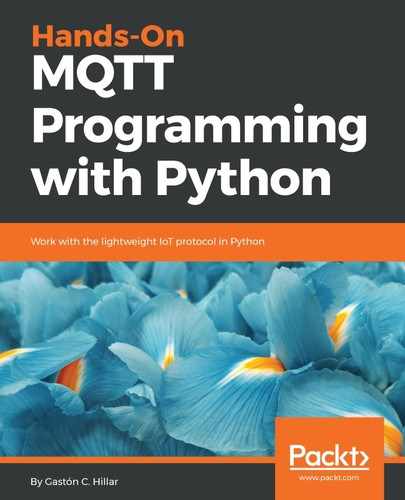Follow these steps to install a Mosquitto server on macOS, known as OS X prior to macOS Sierra:
- If you don't have Homebrew installed, open a Terminal window and run the command indicated on the Homebrew homepage, http://brew.sh, to install this popular package manager for macOS. The following command will do the job. However, it is convenient to check the Homebrew homepage and check all the detailed instructions that are always updated with the newest versions of macOS that become available. If you already have Homebrew installed, move to the next step:
/usr/bin/ruby -e "$(curl -fsSL
https://raw.githubusercontent.com/Homebrew/install/master/install)"
- Open a Terminal window and run the following command to request Homebrew to install Mosquitto:
brew install mosquitto
Notice that in some cases, Homebrew might require additional software to be installed on your computer before you can install Mosquitto. If it is necessary to install additional software, such as Xcode command-line tools, Homebrew will provide you with the necessary instructions.
- The following lines show the last messages shown in Terminal that indicate that Homebrew has installed Mosquitto and the instructions to start the MQTT server:
==> Installing dependencies for mosquitto: c-ares, openssl,
libev, libuv, libevent, libwebsockets
==> Installing mosquitto dependency: c-ares
==> Caveats
A CA file has been bootstrapped using certificates from the
SystemRoots
keychain. To add additional certificates (e.g. the certificates
added in the System keychain), place .pem files in
/usr/local/etc/openssl/certs and run
/usr/local/opt/openssl/bin/c_rehash
This formula is keg-only, which means it was not symlinked into
/usr/local, because Apple has deprecated use of OpenSSL in favor
of its own TLS and crypto libraries. If you need to have this
software first in your PATH run:
echo 'export PATH="/usr/local/opt/openssl/bin:$PATH"' >>
~/.bash_profile
For compilers to find this software you may need to set:
LDFLAGS: -L/usr/local/opt/openssl/lib
CPPFLAGS: -I/usr/local/opt/openssl/include
==> Installing mosquitto
==> Downloading https://homebrew.bintray.com/bottles/mosquitto-
1.4.14_2.el_capit
##################################################
#####################100.0%
==> Pouring mosquitto-1.4.14_2.el_capitan.bottle.tar.gz
==> Caveats
mosquitto has been installed with a default configuration file.
You can make changes to the configuration by editing:
/usr/local/etc/mosquitto/mosquitto.conf
To have launchd start mosquitto now and restart at login:
brew services start mosquitto
Or, if you don't want/need a background service you can just run:
mosquitto -c /usr/local/etc/mosquitto/mosquitto.conf
- After the Mosquitto installation has been completed, run the following command in a new Terminal window to launch Mosquitto with the default configuration file. The -c option followed by /usr/local/etc/mosquitto/mosquitto.conf specifies that we want to use this configuration file:
/usr/local/sbin/mosquitto -c
/usr/local/etc/mosquitto/mosquitto.conf
The following is the output after you run the previous command:
1521488973: mosquitto version 1.4.14 (build date 2017-10-22
16:34:20+0100) starting
1521488973: Config loaded from
/usr/local/etc/mosquitto/mosquitto.conf.
1521488973: Opening ipv4 listen socket on port 1883.
1521488973: Opening ipv6 listen socket on port 1883.
The last lines indicate the Mosquitto MQTT server has opened an IPv4 and an IPv6 listen socket on the default TCP port, 1883. Leave the Terminal window opened, because we need Mosquitto running on the local computer to work with the next examples.
